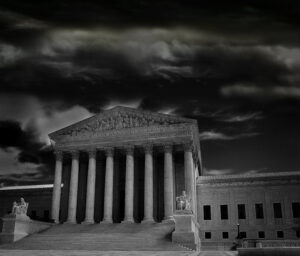
A seemingly insignificant incident made the headlines that should fill us all with shame. The Supreme Court overwhelmingly ruled in favor of a former cheerleader punished by her high school for a profanity-laced Snapchat post criticizing an official decision.
The 8-1 decision was celebrated as a triumph of First Amendment freedom. Because the post was written off the school campus, the justices claim the Pennsylvania teenager could publically post her crudely worded message cursing the school, softball, cheerleading and “everything.”
Necessary Speech?
“It might be tempting to dismiss (the student’s) words as unworthy of the robust First Amendment protections discussed herein. But sometimes it is necessary to protect the superfluous in order to preserve the necessary,” wrote Justice Stephen Breyer, who penned the majority opinion.
Ironically, all the news media reporting on the case blanked out the f-word she repeatedly used in her rant for not being chosen for the varsity cheerleading team. Thus, the most liberal media showed much more respect for others by censoring themselves. They had more decency than the teenager—and the Supreme Court. The Court further validated her crude behavior as something “necessary” and worthy of defense.
Rules of an Unwritten Constitution
Indeed, this case is not about the First Amendment at all. It is about the standards of decency and respect that we choose to defend as a society in pursuit of the common good and unity. There have always been norms that define what is acceptable in our dealings with others. These norms are not determined by law or constitutional amendments. They are customary usages that we follow to avoid offense and foster charity.
Russell Kirk correctly observed that “beneath any formal constitution—even beneath our Constitution, the most enduringly successful of such formal documents—lies an unwritten constitution much more difficult to define, but really more powerful: the body of institutions, customs, manners, conventions, and voluntary associations which may not even be mentioned in the formal constitution, but which nevertheless form the fabric of social reality and sustain the formal constitution.”
What is Wrong with Our Supreme Court?
Thus, this discussion is not about what can be said but what should be said. It is not a matter of whether the screed took place on or off-campus. It is all about our unwritten constitution that undergirds every aspect of our lives.
Help Remove Jesus Bath Mat on Amazon
Our society has norms that govern speech and expression. We agree, for example, not to use racist language as one of those unwritten rules. Many still avoid sexually explicit or erotic language out of respect for the human body. Certain things were always considered improper for fourteen-year-old girls and boys to say. Families taught these things to their children so that they could behave in polite society.
The Supreme Court just decreed there is no such thing as polite society. This decision did nothing to expand our freedom but chained it further to the gutter standards of indecency that turn our lives into a hell of incivility. The court has taken away our sense of shame toward those things that are filthy, vulgar and sinful. We revel in them. Our justices—even those seen as conservative— claim crude words are equal to noble ones. They need not be condemned or lamented but can be proudly voiced and waved triumphantly.
What Has Happened to Our Sense of Shame?
Decisions like this happen when society is unraveling and loses the notion of shame, honor and principle. In this case, the Court improperly validated the smutty behavior that clamors for no restraint. The Justices gave unbridled license to the enslaving passions that fuel the frenetic intemperance of a society that has lost its moral compass. The Court felt free to act because we no longer hold ourselves up to high standards.
When a society has a rich body of philosophical ideas, practices and principles, people apply them to the culture and customs of their lands. This vision creates high standards of behavior, which all are expected to respect. It identifies the lower levels of conduct deemed shameful that are unacceptable, immoral and base.
Satanic Christ Porn-blasphemy at Walmart — Sign Petition
Today, the lowest of behaviors is the common denominator that dominates our lives. It is determined by the anarchic individual who becomes the center of everything, respecting no rules or restrictions. Our hyper-individualistic world turns everything into an obsession for our well-being and gratification to the point that we identify as whatever we care to be.
Thus, a fourteen-year-old girl feels entitled to curse her school and superiors in a runaway screed. The Supreme Court’s decision gets everything wrong. It subordinates the common good to the coarsest whims of the unruly. Speech is subverted to communicate disorder instead of truth. It glorifies our baser instincts at the expense of the noblest.
The purpose of law is to facilitate the common good and virtuous life in common. In this case, of the foul-mouthed cheerleader, the Supreme Court sided with shame and disorder.
Photo Credit: © zimmytws – stock.adobe.com


